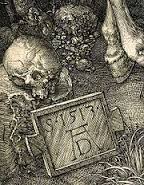by Rev. Paul Doellinger
 We typically think of our sins as a series of misdeeds, transgressions or mistakes that we make from time to time. However, sin is much more than a misstep here and there. At its root, sin is enmity with God. Sin alienates us from God and gives us a hostile mind towards Him (1 Corinthians 2:14; Ephesians 2:12; Colossians 1:21). In our sin we cannot know God, trust in Him, or seek anything from Him (Romans 3:10-12).
We typically think of our sins as a series of misdeeds, transgressions or mistakes that we make from time to time. However, sin is much more than a misstep here and there. At its root, sin is enmity with God. Sin alienates us from God and gives us a hostile mind towards Him (1 Corinthians 2:14; Ephesians 2:12; Colossians 1:21). In our sin we cannot know God, trust in Him, or seek anything from Him (Romans 3:10-12).
This hostility and alienation is immediately evident after our first parents’ fall into sin. What was perfect and right in Paradise was completely lost at the fall. Adam and Eve went from knowing and loving God to hating and fleeing from Him. Yet our Lord pursues the sinner. In Genesis 3:15 (the Bible’s first proclamation of the Gospel) we see our Lord’s compassion and mercy on the sinner. Rather than leaving Adam and Eve in the depravity of their alienation and hostility, God promised One Who would come and crush the serpent’s head. Jesus is the promised Seed of the Woman Who would reconcile a world of sinners back to God, thus restoring that perfect love and knowledge of God lost at the fall.
Read Genesis 3:7-15.
1. Adam and Eve felt naked and ashamed. They covered themselves in fig leaves and hid themselves from the Lord. Luther declares that their sin “brings about what is worst: that Adam and Eve avoid their Creator and God and take refuge under the protection of the fig trees, both to cover themselves and to hide in the midst of the trees. What can be termed more horrible than to flee from God and to desire to be hidden from Him? …It is the utmost stupidity for us to imagine that our cure lies in flight from God rather than in our return to God, and yet our sinful nature cannot return to God.”[1] Why did Adam and Eve hide? How do we attempt to hide from God?
2. Under the condemnation of the Law, Adam and Eve sought to excuse themselves and blame others. Luther says, “This is the nature of sin: unless God immediately provides a cure and calls the sinner back, he flees endlessly from God and, by excusing his sin with lies, heaps sin upon sin until he arrives at blasphemy and despair…till finally the sinful person would rather accuse God than acknowledge his own sin.”[2] Why does the sinner flee from God and His Law?
 3. Commenting on Adam and Eve’s behavior toward God after the fall, Luther writes, “When there is no promise of forgiveness of sins and no faith, the sinner cannot act otherwise. If God had said: ‘Adam, you have sinned; but I shall forgive your sin,’ then with the utmost loathing Adam would have humbly and frankly acknowledged his sin. But because the hope of forgiveness is not yet available, he feels and sees nothing except death itself because of his transgression of the command. However, because nature is unable to avoid death, Adam cannot be brought to a confession of his sin. He tries every possible device to clear himself of his guilt. In the same way every sinner hates his punishment. Moreover, because he hates his punishment, at the same time he hates God’s justice and God himself; and he tries with all his might to persuade God and everybody else that he is suffering innocently.” [3] After the Law has been preached, why is it so necessary to hear the Gospel of forgiveness?
3. Commenting on Adam and Eve’s behavior toward God after the fall, Luther writes, “When there is no promise of forgiveness of sins and no faith, the sinner cannot act otherwise. If God had said: ‘Adam, you have sinned; but I shall forgive your sin,’ then with the utmost loathing Adam would have humbly and frankly acknowledged his sin. But because the hope of forgiveness is not yet available, he feels and sees nothing except death itself because of his transgression of the command. However, because nature is unable to avoid death, Adam cannot be brought to a confession of his sin. He tries every possible device to clear himself of his guilt. In the same way every sinner hates his punishment. Moreover, because he hates his punishment, at the same time he hates God’s justice and God himself; and he tries with all his might to persuade God and everybody else that he is suffering innocently.” [3] After the Law has been preached, why is it so necessary to hear the Gospel of forgiveness?
4. Within God’s condemning speech to Satan there is a promise given to Adam and Eve: “These words are spoken for the sake of Adam and Eve that they may hear this judgment and be comforted by the realization that God is the enemy of the being that inflicted so severe a wound on man. Here grace and mercy begin to shine forth in the midst of wrath which sin and disobedience aroused. Here in the midst of most serious threats the Father reveals His heart…Who points to deliverance, indeed who promises victory against the enemy that deceived and conquered human nature.”[4] How is our salvation and reconciliation with God imbedded in the condemnation of the devil?
5. Adam and Eve were given to trust the promised Gospel of Genesis 3:15. As Luther says, “Their consolation against sin and despair was their hope for this crushing, which was to be brought about in the future through Christ…[Adam and Eve] are full of sin and death. And yet, because they hear the promise concerning the Seed who will crush the serpent’s head, they have the same hope we have, namely, that death will be taken away, that sin will be abolished, and that righteousness, life, peace, etc. will be restored. In this hope our first parents live and die, and because of this hope they are truly holy and righteous.”[5] Adam and Eve are saved from death and hell by faith in the promise of God. Where does God give that same promise to you today?
 The promise of God given in Baptism is a Word of God that you always have with you. As Luther says, “Through Baptism we are restored to a life of hope, or rather to a hope of life. This is the true life, which is lived before God. Before we come to it, we are in the midst of death…We who believe in Christ have the hope that on the Last Day we shall be revived for eternal life.”[6]
The promise of God given in Baptism is a Word of God that you always have with you. As Luther says, “Through Baptism we are restored to a life of hope, or rather to a hope of life. This is the true life, which is lived before God. Before we come to it, we are in the midst of death…We who believe in Christ have the hope that on the Last Day we shall be revived for eternal life.”[6]
In our sin we are alienated from God. We cannot know Him. Indeed, we are hostile to and flee from Him. Just as our first parents fled from God and yet were pursued by Him, so we have hope in Christ, Who pursues and calls us by His Word of the Gospel. Like Adam and Eve, we are given to trust in a Word of promise. This promise directs us to the hope we have in Christ Jesus and His saving grace. As Luther says, “Thus we also live in the same hope. And, because of Christ, when we die, we keep this hope, which the Word sets before us by directing us to put our trust in the merits of Christ…Because of the promised Son of God, who would crush the head of the devil [Adam and Eve] hope for the resurrection of the flesh and eternal life after the temporal death of the flesh, just as we do.”[7]
The Rev. Paul M. Doellinger is pastor of St. Paul Lutheran Church in Cassopolis, Mich.
[1] Luther, Martin. Luther’s Works, vol. 1: Lectures on Genesis Chapters 1-5 (J. J. Pelikan, Ed.). Saint Louis: Concordia Publishing House, 1958., pgs. 172, 174
[2] Ibid., pg. 175
[3] Ibid., pg. 177-178
[4] Ibid., pg. 189
[5] Ibid., pg. 191, 197
[6] Ibid., pg. 196
[7] Ibid., pg. 197, 198
